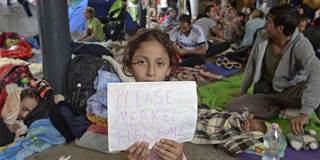Germany – a country that, less than a century ago, was a source of huge numbers of refugees – has become the most desired destination for those fleeing the Middle East and Africa, and a moral compass for the rest of Europe. How did the country move so rapidly from darkness to light?
PARIS – “Germany, Germany,” shout thousands of refugees, faced with the obvious bad will of Hungary’s political authorities, in front of Budapest’s Keleti railway station. They are dreaming of Germany – not any European country, but specifically Germany – the way, more than a century ago, Europe’s poor, fleeing misery – and, in some cases, pogroms – dreamed of America.

PARIS – “Germany, Germany,” shout thousands of refugees, faced with the obvious bad will of Hungary’s political authorities, in front of Budapest’s Keleti railway station. They are dreaming of Germany – not any European country, but specifically Germany – the way, more than a century ago, Europe’s poor, fleeing misery – and, in some cases, pogroms – dreamed of America.